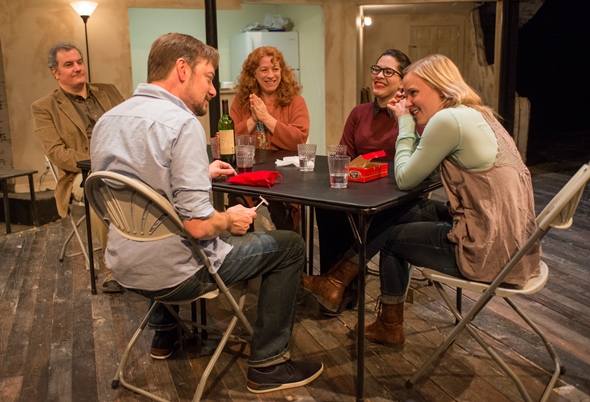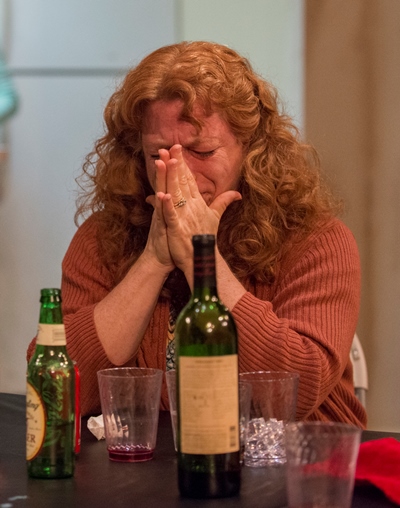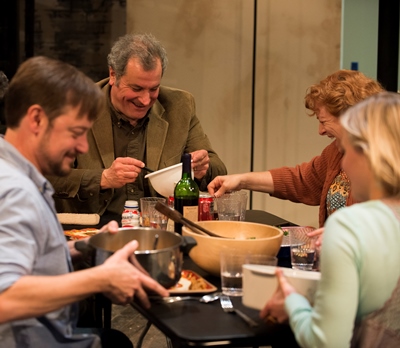‘The Humans’ at American Theater Company: Family as vortex of love and the unspeakable
 Review: “The Humans” by Stephen Karam, at American Theater Company through Feb. 1. ★★★
Review: “The Humans” by Stephen Karam, at American Theater Company through Feb. 1. ★★★
By Lawrence B. Johnson
As a slice of life play, Stephen Karam’s “The Humans,” taps deep into the real and complicated meaning of family values, and it leaves a stunning impression. In American Theater Company’s close-knit ensemble production, it is casually articulate, genuinely empathic, starkly true.
 All is not well in the Blake family, an Irish American clan rooted in Scranton, Pa., with two grown daughters relocated – the younger, Brigid, might say fled – to Manhattan. It’s Thanksgiving, and mom and pop have ventured into the big city with his mother, suffering acutely with dementia, to spend the day with both daughters in the downtown, down-at-the-heels apartment (David Ferguson’s flavorful design) that Brigid now shares with her boyfriend Richard.
All is not well in the Blake family, an Irish American clan rooted in Scranton, Pa., with two grown daughters relocated – the younger, Brigid, might say fled – to Manhattan. It’s Thanksgiving, and mom and pop have ventured into the big city with his mother, suffering acutely with dementia, to spend the day with both daughters in the downtown, down-at-the-heels apartment (David Ferguson’s flavorful design) that Brigid now shares with her boyfriend Richard.
Brigid is a classically trained musician who’s out of work. Older sister Aimee is – or rather, has been – a successful lawyer, but serious illness has thrown her off the partner track. She is also a lesbian, and bearing a great burden of heartache.
Their mother, Deirdre, in dumpy mid-life plumpness but blessed with a striking mane of red hair, is an ever-poised helper (meddler, if you like). A devout Catholic, she has brought Brigid a sort of house-warming gift: a small wooden statue of the Blessed Virgin, which, she assures her daughter, can make a real difference and so she should at least keep it in a drawer.
The father, Erik, is a physically imposing man whose daughters even call him Big Guy. He seems distracted on this visit, paces a lot, admits he hasn’t been sleeping well. Erik is something like custodian at a high school back in PA. Deirdre boasts that his duties have been expanded, but he waves that off with a modest mutter.
 You could say the Blake family is, well, openly conversant. They talk a lot and everything’s out on the table. They say plain things plainly, more often than not with a little jab thrown in for emphasis. Seems they’ve all mastered the same tools of elocution, and it’s often hard to tell whether those are needles or scalpels. Indeed, an amazed observer might wonder where the brusque love ends and acid drip begins.
You could say the Blake family is, well, openly conversant. They talk a lot and everything’s out on the table. They say plain things plainly, more often than not with a little jab thrown in for emphasis. Seems they’ve all mastered the same tools of elocution, and it’s often hard to tell whether those are needles or scalpels. Indeed, an amazed observer might wonder where the brusque love ends and acid drip begins.
In the deceptive fray of ATC’s fluent staging directed by PJ Paparelli, Keith Kupferer heads a masterful cast as Erik Blake, a regular enough guy concerned about the move Brigid has made into this rather sorry two-floor apartment, with its single window (upstairs, at ground level) barred against potential intruders – and far worse, located within hailing distance of Ground Zero. Erik was not far from the Twin Towers when they went down, and the experience still keeps him on edge.
Kupferer conveys all the barely contained angst of a man in fact preoccupied by something a good deal more serious than his daughter’s choice of digs. Through a Thanksgiving meal served on paper plates as seasoned with a crescendo of bickering, Erik waits for the right moment to tell what must be told. His nerves are stretched by the constant, loud banging from upstairs (an older Chinese lady, Brigid explains), the failure of several lightbulbs – Brian Hoehne’s lighting is virtually another character – and the attention required by his oblivious mother (Jean Moran).
 Kelly O’Sullivan delivers a study in deep conflict as Brigid, ever the little princess, self-absorbed and yet dying inside from her professional failure to launch. Sadieh Rifai gives a credible and affecting performance as the bright older sister Aimee, keenly responsive to her parents’ need even as she confronts her own dire medical prospects and grieves over the split-up with her partner.
Kelly O’Sullivan delivers a study in deep conflict as Brigid, ever the little princess, self-absorbed and yet dying inside from her professional failure to launch. Sadieh Rifai gives a credible and affecting performance as the bright older sister Aimee, keenly responsive to her parents’ need even as she confronts her own dire medical prospects and grieves over the split-up with her partner.
Yet the unhappiest soul at the table is Deirdre, who knows the score of a game still to be named. Hanna Dworkin’s expansive portrayal swings from the cheery intrusions of a too-helpful mom to the unutterable despair of a woman at the precipice.
As Brigid’s boyfriend Richard – older than her, owner of the apartment, recipient-in-waiting of a family trust – Lance Baker cuts an amusingly soft-spoken figure eager to be nice to these feisty in-laws. Not incidentally, Richard has grown up with a mother who is a therapist and he’s had a couple of college courses in that subject. He knows a neurotic lot when he sees one.
If the strength of “The Humans” lies in its journey, its tumultuous progression, the arrival at Erik’s revelation feels underwritten — almost incidentally dispatched, less than the mortifying disclosure that it is. Perhaps the solution is sharper focus by the director, but I suspect the real need is for a sharpened pencil and a bit of rewriting. As a family photo, however, this play is a three-dimensional beauty. No frame could hold it.
Related Link:
- Performance location, dates and times: Details at TheatreinChicago.com
Tags: American Players Theater, Brian Hoehne, David Ferguson, Jean Moran, Keith Kupferer, Kelly O'Sullivan, Lance Baker, PJ Paparelli, Sadieh Rifai, Stephen Karam, The Humans


No Comment »
1 Pingbacks »
[…] Review of “The Humans” at American Theater Company: Read it at ChicagoOntheAisle.com […]